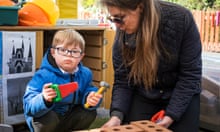Teaching assistants have emerged as the “unsung heroes” of the pandemic with more than half stepping up to take classes in schools during lockdown while teachers delivered remote learning to children at home, a study shows.
Researchers at UCL Institute for Education found nearly nine out of 10 (88%) TAs supported vulnerable and key worker children in school during lockdown, with 51% managing a whole class or bubble on their own, as teachers prepared and delivered remote lessons, often from home.
The report, published this week, is based on analysis of data from more than 9,000 teaching and classroom assistants in schools across the UK and shows for the first time the pivotal role they played in keeping schools open and children learning amid the disruption caused by Covid.
Almost half (49%) covered staff absences, enabling schools to stay open to vulnerable and key worker children, leading some to observe that the “lowest-paid TAs are in school doing the dangerous face-to-face work”.
Those working in early years and special schools, who were in close contact with children without personal protective equipment, felt particularly vulnerable. As one TA put it: “We have put our lives at risk more than any school staff during the pandemic.”
TAs are among the lowest paid workers in the UK, with a median income of less than £14,000. As well as managing larger groups on school premises, the UCL survey said TAs were vital in helping children to carry on learning at home, providing targeted support and picking up on the needs of individual children.
“TAs have been absolutely key in allowing schools to keep functioning during the pandemic,” said Dr Rob Webster, one of the authors of the report which was funded by Unison.
“Our report highlights that in many ways teaching assistants have been the ‘unsung heroes’ of the pandemic and it is hard to see how schools could have managed without them. Some respondents described themselves as working ‘on the frontline’ and shouldering much of the responsibility for keeping schools open.”
Nearly one in four TAs said they had taken on new responsibilities without any additional training and 44% said they had picked up new digital skills during the pandemic. “They really have gone above and beyond,” said Jill Roseblade, executive headteacher of Alver Valley nursery, infant and junior schools in Gosport, Hampshire.
Another of the report’s authors, Prof Gemma Moss said the work required to keep schools functioning had intensified during the winter 2021 lockdown as a result of a new legal requirement to supply remote education to all children learning at home.
There were also far greater numbers of pupils in schools in England than during previous lockdowns, after the government extended the list of parents who qualified as critical or key workers.
“This increased workload for teachers and TAs who had to find ways of managing children in school and providing lesson content for those at home and our findings suggest this may have led to increased anxiety as TAs juggled many different tasks.”
Unison head of education Jon Richards said: “Teaching and classroom assistants were crucial to the smooth running of schools before the pandemic. Schools have relied upon them even more so this past year. This research proves that.
“However, staffing ratios have been increasing and many higher-level posts cut. This has piled the pressure on, and increased the workload of poorly paid lower grade employees, who are frequently asked to cover work they’re not trained to do.
“Teaching and classroom assistants have a vital role in helping pupils catch up on their lost learning post-pandemic. But to do this they need proper training and a decent wage.”
The Department for Education has been approached for comment.








